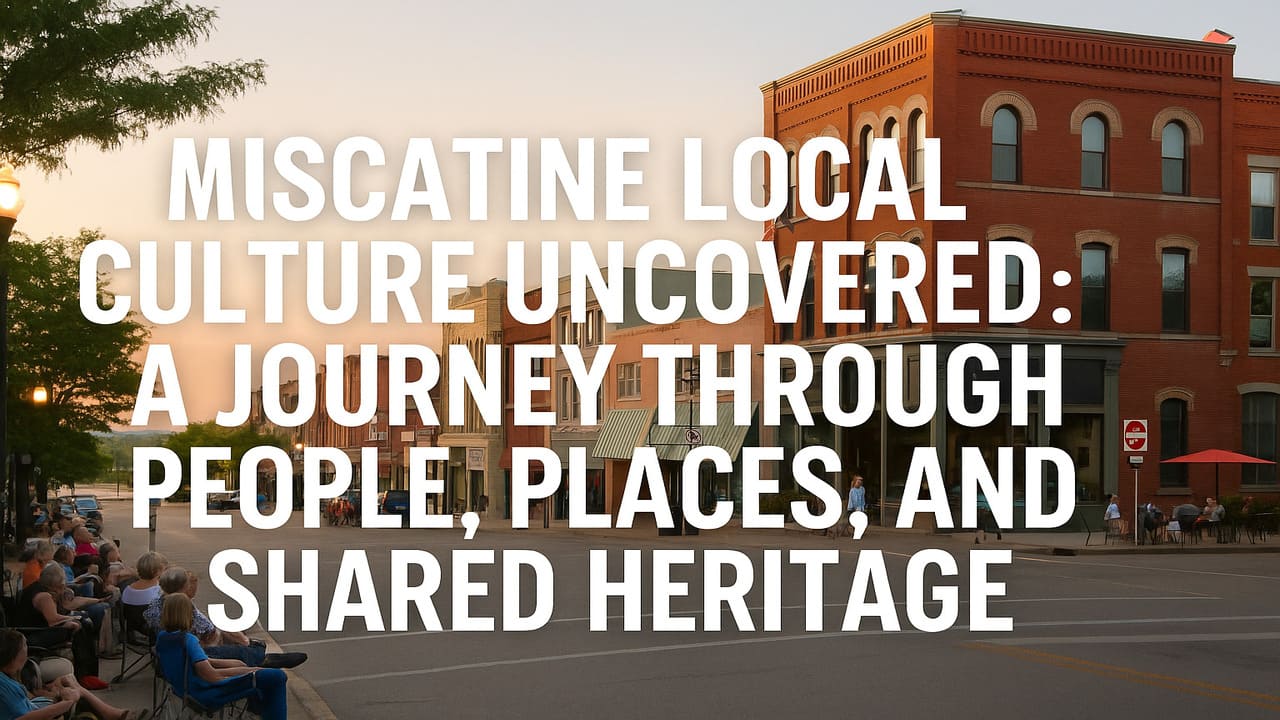
Meet Muscatine – Muscatine may appear to be a small, quiet river town but beneath its modest charm lies a vibrant local culture shaped by generations of stories, traditions, and community pride. From the colorful murals downtown to the rhythms of seasonal festivals and porch conversations at sunset, Muscatine’s culture is alive in the people who live there and the places they hold dear. To understand Muscatine Local Culture is to dive into the fabric of everyday life, where cultural heritage is not tucked away in museums but lived out daily in food, family, and friendship.
The heart of Muscatine’s culture beats in its people. Here, families have lived for generations, and many locals can trace their roots back to immigrant communities who settled along the Mississippi in the 1800s. German, Irish, and Eastern European heritages still echo in surnames, traditions, and community celebrations.
What sets Muscatine apart is the deep intergenerational connection grandparents who grew up walking the same riverfront pass down stories to children now biking along the same path. Local schools, churches, and service organizations serve not just educational or spiritual purposes but act as community anchors where relationships thrive across age groups.
Locals greet one another by name in grocery store aisles, and neighborhood potlucks are still common. Whether you’re new to town or have lived there for 40 years, Muscatine welcomes you like family a spirit of inclusion that defines its cultural identity.
Read More : Samson and Delilah: A Warrior’s Strength and a Woman’s Betrayal
Muscatine’s sense of place is deeply tie to its history and geography. The Mississippi River is more than a backdrop it has influenced local life, industry, and recreation for centuries. It’s not uncommon to see families fishing, children skipping stones, or artists sketching the sunset at Riverside Park. The riverfront is where memories are make.
Downtown Muscatine also plays a central role in expressing local culture. Historic buildings that once housed button factories an industry that made Muscatine the “Pearl Button Capital of the World” now accommodate coffee shops, artist studios, and independent boutiques. These buildings aren’t just preserved for nostalgia they’re actively used and reinterprete giving new life to old spaces.
Landmarks like the Muscatine Art Center, housed in the 1908 Laura Musser Mansion, offer not only art exhibits but public programs that teach kids about local history and inspire the next generation of creatives.
In Muscatine, culture isn’t something you observe it’s something you participate in. Every season brings a community celebration. From Almost Friday Fest on the riverfront to the Great River Days and Holiday Stroll, these events are not just entertainment they’re expressions of shared identity.
Local food is also a cultural marker. Farmers’ markets thrive with homegrown produce and handmade goods, while family-owned restaurants serve dishes passed down through generations. The mix of Midwestern comfort food and ethnic flavors from the city’s Hispanic and Southeast Asian communities highlights the growing diversity of Muscatine’s cultural landscape.
Even everyday routines like watching high school football games on Friday nights or gathering at the Hy-Vee deli after church are small cultural rituals that build a strong sense of belonging.
Read More : Muscatine Community: The Real Heartbeat Behind Iowa’s Hidden Gem
One of the most powerful expressions of Muscatine’s local culture is its public art and storytelling tradition. Murals around town celebrate everything from Mark Twain’s visits to the stories of working-class families who shaped the city’s economy. Local initiatives like “Voices of Muscatine” document and share resident narratives through video, audio, and photography ensuring that no voice goes unheard.
The Muscatine Symphony Orchestra, local theater productions, and school-based music programs all contribute to a cultural atmosphere where the arts are valued and accessible. Meanwhile, spoken word nights and poetry readings at independent bookstores keep literary traditions alive.
In many ways, Muscatine’s culture is a mosaic of small stories that come together to form a collective memory constantly evolving, but rooted in pride.
While much of Muscatine’s culture is built on legacy, its future lies in the hands of its youth. Today’s young residents are increasingly active in shaping what local culture means to them through digital storytelling, creative entrepreneurship, and activism.
High school students lead community cleanups, host multicultural festivals, and produce media projects that document the past while pushing forward new ideas. Youth-focused programs at the library and art center aim to empower the next generation to preserve heritage while also reimagining it.
This blend of tradition and innovation ensures that Muscatine’s culture remains dynamic, relevant, and reflective of all its voices young and old.